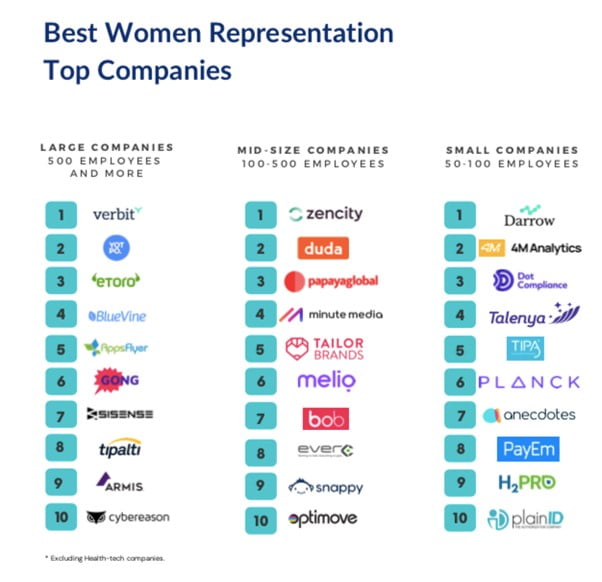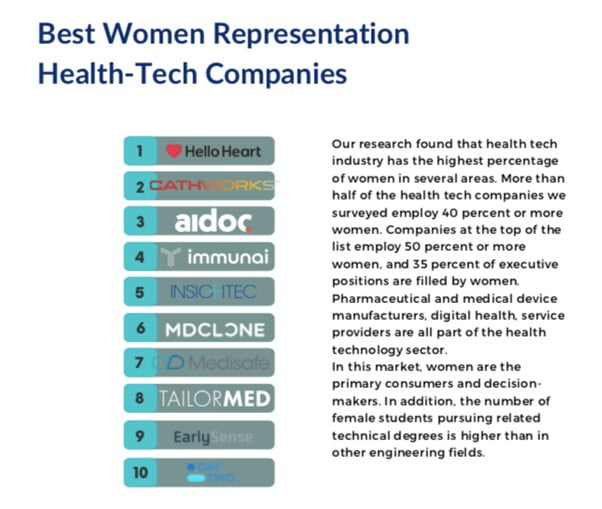An Israeli study that examined 424 tech startups and 70 VC funds in Israel found that the average percentage of women represented in mid-rise or mid-size companies was at a sparse 33 percent.
The survey was conducted by Power in Diversity (PID) Israel, a joint venture of over 220 VCs and startups working together to promote diversity and inclusion in the Israeli tech industry.
The initiative was inspired by the National Venture Capital Association (NVCA), which has had a desire to increase diversity in the US tech industry, and VC Kate Mitchell, who chairs the NVCA’s Inclusion and Diversity Task Force.

“Israeli startups have accomplished amazing achievements and positioned our local industry as one of the strongest and most innovative industries in the world. However, while technological capabilities and financial achievements are growing fast, progress toward greater gender, racial, and ethnic diversity is not keeping pace,” the report’s Executive Summary says, “Startups have made some progress with respect to the increase of female representation. There are companies working to increase the number of women in leadership positions and improvements can be seen through the recruitment of more women to technological positions, but the number of women in these roles is still relatively low.”
The report is said to be the first step in the creation of a diversity index which pertains to women, Orthodox Jews, Arabs, Ethiopian Jews, the elderly, individuals with physical or mental disabilities, and individuals on the autistic spectrum. The team behind PID hopes the index will help Nasdaq-listed companies or those that are in the initial public offering stage to comply with the new Employment Diversity Requirements. The index will also help investors understand the values of the company and capture the creativity and flexibility of the management team. It can also help companies see where they are regarding diversified employment.

While the data showed that the average percentage of women in Israeli tech was low, there are differences in the data regarding the representation of women in the workplace, based on the size of the company. According to the report, there is a more substantial presence of women in large companies at 36 percent, than in smaller companies where the figures show 30.8 percent. These figures support the argument that it may be more challenging to perform diversification processes in smaller companies. There are various reasons for this, the report says. They stem from the fact that big companies have a larger operating system as well as a greater pool of resources, which are focused on recruiting. Also, large companies have a greater need of HR, legal, finance, and support roles that are typically filled by women.
The representation of women in actual tech jobs is a mere 27 percent – and this changes based on the function of the company. Only 23.4 percent of management roles such as VP, director, and others) are filled by women. Less than a quarter of the decision-makers in the ecosystem are women, the report shows. In March 2020, NoCamels reported that according to the Nisha group, an Israeli recruitment, and placement firm specializing in biotech, biomed, fintech, and cleantech, women make up 60 to 70 percent of roles in the biotechnology sector in Israel. Nisha also noted that while this was a number that had not changed in almost a decade — with women leading research teams and heading clinical trials — men still dominate upper management and executive roles. The report was first published in 2021.
SEE ALSO: Digital Health CEO To Represent Israel In Women’s Entrepreneurship Final in Dubai
The industries that have the lowest percentage of female representation in the workforce include cybersecurity (27 percent,) automotive (24 percent), electronics (20.8 percent,) and telecommunication industries (18 percent.) While the report says that this data might be partially explained by the smaller number of women educated in these disciplines, a list of Israeli tech companies that represent a larger, more outstanding number of employees in general and particularly, in development roles, indicates that things can be done differently.
40 Israeli tech firms that lead in female representation
The list of companies that take the lead in female representation is divided into four categories (big, medium, small and health tech). The top 10 large companies, of 500 employees or more, that have the best female representation include Israeli AI transcription & real-time captioning solution Verbit, followed by eCommerce marketing platform Yotpo and Israeli social trading and multi-asset brokerage company eToro in the top three. Rounding out the top five are Israeli-founded fintech firm BlueVine and mobile marketing firm AppsFlyer. The rest of the large companies in the top 10 include AI-based online and mobile platform Gong, infused analytics platform Sisense, automation platform Tipalti, security firm Armis, and cybersecurity company Cybereason.
Sign up for our free weekly newsletter
Subscribe
The top 10 mid-size companies, from 100 to 500 employees, include Tel Aviv-based community engagement tools firm Zencity in the first place, followed by Israeli-founded professional website builder Duda, and Papaya Global. Papaya Global is the global payroll service headed by female CEO and co-founder Eynat Guez that skyrocketed to a $3.7 billion valuation in 2021. The rest of the top 10 includes companies like digital media and tech platform Minute Media, branding platform Tailor Brands, supplier payment platform Melio, Israeli startup bob, risk intelligence firm EVerC, gift tech firm Snappy, and customer experience platform Optimove.

The top 10 smaller companies, from 50 to 100 employees, with strong female representation, include legal claim mining firm Darrow, subsurface-infrastructure geo-data firm 4M Analytics, compliance cloud solution Dot Compliance, talent sourcing firm Talenya, and compostable packaging company Tipa rounding in the top five. The rest of the list includes commercial insurance data platform Planck, compliance platform Anecdotes, expense management platform PayEm, hydrogen fuel production tech startup H2Pro, and policy-based access control platform PlainID.

The 10 health companies that have the best female representation include health monitoring startup Hello Heart and CAD medtech startup CathWorks in first and second place. AI medical imaging startup Aidoc, health analytics startup Immunai and focused ultrasound startup Insightec round out the top five. They are followed by healthcare data platform MDClone, personalized medication management platform Medisafe, health financial navigation startup TailorMed, contact-free monitoring startup EarlySense, and precision medicine startup Day Two.
Women in venture capital firms
The study looked at female representation at 70 VC firms. Of those firms, only 14.8 percent of the partners are women and nine percent are investing partners, according to the report. This orrelates with the percentage of companies that are founded by women in the tech industry which is just 12 percent – a significant increase as of the last couple of years, but far from the halfway mark.

“The report highlights a point of view about women working in the ecosystem which is both critical and credible. Undoubtedly, the situation is far from satisfactory. Women should fulfill many more of the leading roles in companies and VC,” says Sivan Shamri Dahan, managing partner at Qumra Capital and co-chair of the initiative. “There is no reason why the makeup of the human factor in the ecosystem should not represent the number of women in the general population, and, furthermore, the number of qualified women for these roles. Start-ups should focus on recruiting more employees of underrepresented populations and PID is here to help them.”
“I believe that 2022 will be the Year of Diversity for our start-up industry,” adds Kobi Sambursky, funding partner at Glilot Capital and a co-chair of the initiative, “The last couple of years have been extraordinary for the Israeli ecosystem, with much funding, public companies, and unicorns. However, there is much to be done regarding diversity,” he continues, “We hope and believe that our following reports will present an improving trend. There is no doubt that the Startup Nation needs diversity to keep on thriving.”
“PID believes that measuring the diversity data is an integral part of the success of the process. Many companies are unaware of the diversity measures of their employees as well as the representation rate in the various populations. We hope that showcasing the companies that are doing this successfully by allocating considerable resources to the implementation of diversity programs and focusing on expanding the pool of candidates that are underrepresented in the workforce will serve as an inspiration to organizations that are interested in doing more and to those who prioritize diversity as a significant part of their workplan,” said Shahar Silis, PID managing director.
PID has been funded by Alan Feld, a funding partner at Vintage Investment Partners, as well as Samburksy and Shamri Dahan. They are also co-chairs of the initiative.
VCs that support the project and assist in running it include Pitango Capital Venture, Viola, Hearst Ventures, NFX SVB, Elah Fund, Maor, DTCP, Grove, BRM, New Era Ventures and more. They are joined by 170 startups as well as philanthropic entities that fund the processes which take place within organizations and are designed to change the organizations’ perceptions and cultures and make them more inclusive.
Related posts

Editors’ & Readers’ Choice: 10 Favorite NoCamels Articles

Forward Facing: What Does The Future Hold For Israeli High-Tech?

Impact Innovation: Israeli Startups That Could Shape Our Future




Facebook comments